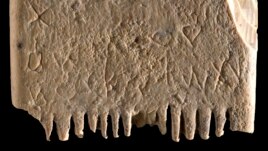12 November 2022
Israeli researchers have found an ancient comb that has what is likely the oldest known full sentence written in Canaanite. The discovery was described in a study published recently in the Jerusalem Journal of Archaeology.
The writing could be 3,700 years old. It tells people to comb their hair and beards to remove small insects known as lice. The sentence contains 17 letters that read: "May this tusk root out the lice of the hair and the beard."
Experts say the discovery gives information about some of the earliest use of the Canaanite alphabet, invented around 3,800 years ago. The Canaanite alphabet was the base for later alphabetic systems, such as Hebrew, Greek, Latin and Cyrillic.

This undated image released by the Israel Antiquities Authority on Wednesday, Nov. 9, 2022, shows an ivory comb with an entire sentence in the Canaanite language. (Dafna Gazit, Israel Antiquities Authority via AP)
The subject of the writing suggests that people had trouble with lice in everyday life at the time. Researchers said they have even found microscopic evidence of head lice on the comb.
The comb was first found in 2016 in southern Israel. But it was only late last year when a professor at Israel's Hebrew University noticed the tiny words written on it.
The lead researcher, Yosef Garfinkel of Hebrew University, spoke to The Associated Press. He said that while many ancient objects with Canaanite writing have been found over the years, the comb has the first complete sentence to be discovered.
Garfinkel said earlier findings contained just a few letters, maybe a word here and there. Such short pieces of writing did not leave much room for further research on the lives of the Canaanites. "We didn't have enough material," he said.
The find opens up the debate about the ancient time period, Garfinkel added. He said it was important that the sentence was found on an ivory comb in the ancient city's palace and temple area. It also was notable that the writing spoke of a beard. Garfinkel said it could suggest that only wealthy men were able to read and write.
"It is a very human text," Garfinkel said. "It shows us that people didn't really change, and lice didn't really change."
Canaanites spoke an ancient Semitic language that is related to modern Hebrew, Arabic and Aramaic. The Canaanites lived in the lands along the eastern Mediterranean. They are believed to have developed the first known alphabetic system of writing.
The complete sentence further suggests that Canaanites stood out among early civilizations in their use of the written word. "It shows that even in the most ancient phase there were full sentences" Garfinkel added.
He said experts dated the script to 3,700 years ago by comparing it to the ancient Canaanite alphabet found earlier in Egypt's Sinai Desert. Such writing dates back between 3,900 and 3,700 years.
But, the study noted, carbon dating of the comb failed to show its exact age.
Austrian archaeologist Felix Höflmayer, an expert on the period who was not part of the publication, said the method of dating was not good enough.
"There are just not enough securely dated early alphabetic inscriptions currently known," he said. But, he added the discovery was important.
"Seventeen letters preserved on a single object is definitely remarkable," Höflmayer said.
I'm John Russell.
Eleanor H. Reitch reported on this story for the Associated Press. John Russell adapted it for VOA Learning English.
_________________________________________________________________
Words in This Story
comb – n. a flat object with a row of thin teeth that is used for making hair neat
tusk – n. a very long, large tooth that sticks out of the mouth of an animal (such as an elephant, walrus, or boar)
alphabet – n. the letters of a language arranged in their usual order
professor – n. a teacher especially of the highest rank at a college or university
phase –n. a period that is part of a series of events showing a process of development
inscription – n. words that are written on or cut into a surface